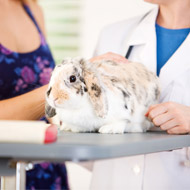
Six animals killed at an animal rescue centre in Lancashire
Rabbit owners are being urged to vaccinate their pets against rabbit haemorrhagic disease variant two (RHVD-2) after six animals died of the virus at an animal rescue centre in Lancashire.
The animals belonged to Pennine Pen Animal Rescue in Oldham and were taken in by the charity when they were abandoned or handed in as strays. Although the rabbits had been vaccinated against RHDV and myxomatosis, they had unfortunately not been protected against this new variant.
A postmortem on two of the bunnies by Tameside Veterinary Clinic confirmed suspicions the rabbits were suffering from RHDV-2. The surviving rabbits at the rescue centre have since been vaccinated.
RHDV-2 is a symptomless disease that has killed hundreds of rabbits across the UK. It spreads by direct contact with infected wild rabbits, or indirectly via urine or faeces found in hay and straw bedding.
“One of the rabbits at the charity died and then, two days later, one more died and had haemorrhaged from its rectum, which raised suspicions,” explained senior vet Loren Shearing. “Three more died and, when I went to vaccinate them, another looked very unwell so we euthanised him. The others were all fine and lively before sudden death."
She continued: “The rabbit pen is closed off and members of the public can’t handle the rabbits, so the only thing we can link it to is hay bales from a local farm, which could have urine or faeces in from an infected rabbit.”
Pennine Pen Animal Rescue assistant manager Joanne Worsley added: “There were no signs there was anything wrong as some of the rabbits we lost were hopping about and eating grass the day before they died.
“They were vaccinated against RVHD and myxomatosis, but not against this new strain of RVHD-2. They have now been vaccinated against it and hopefully, there is a chance of them all surviving.”
Following this outbreak, vets are calling on members of the public to protect their rabbits against this incurable, yet vaccine-preventable disease.
“RVHD-2 is a silent killer and can be very distressing for owners who find their pets have died suddenly for no apparent reason,” Dr Shearing added. “It is extremely important that rabbit owners have their pets vaccinated annually against RVHD and myxomatosis, before a second vaccination to combat RVHD2.”



 The RCVS has announced a new version of its 1CPD mobile app, with enhanced features for veterinary surgeons and veterinary nurses to record their continuing professional development.
The RCVS has announced a new version of its 1CPD mobile app, with enhanced features for veterinary surgeons and veterinary nurses to record their continuing professional development.